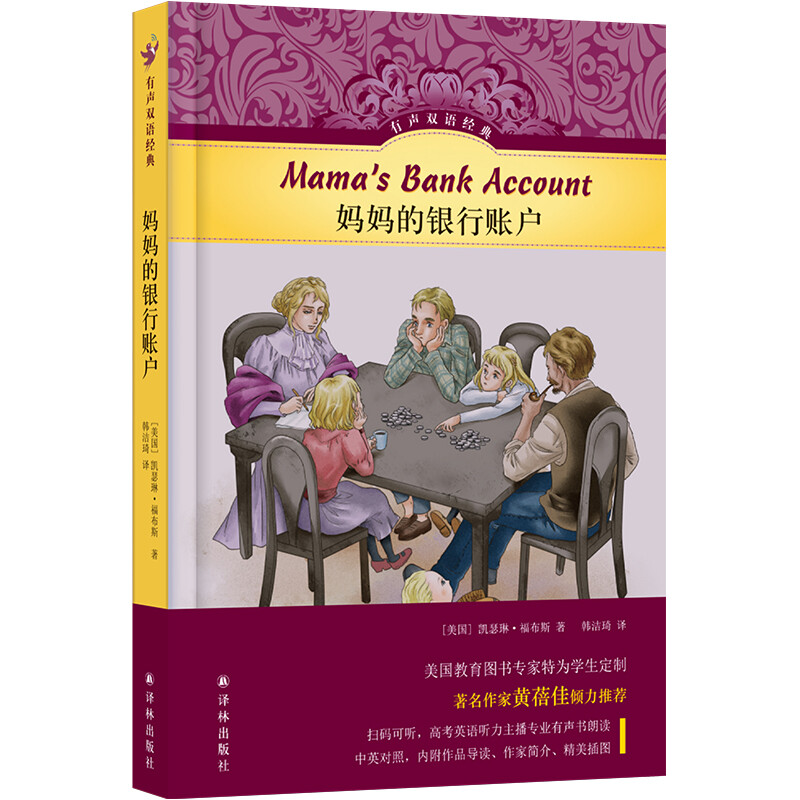- ISBN:9787544791427
- 装帧:一般胶版纸
- 册数:暂无
- 重量:暂无
- 开本:32开
- 页数:224
- 出版时间:2022-08-01
- 条形码:9787544791427 ; 978-7-5447-9142-7
本书特色
译林“有声双语经典”精选贴近中国学生英语习得水平的经典作品。丛书甄选优质中文译本,配以导读、作家作品简介和插图,并聘请资深高考听力卷主播朗读英语有声书。有声书播放平台操作便捷,只需扫描书中二维码,即可收听。丛书选目涵盖各国经典文学作品,让孩子在阅读中提高文学鉴赏能力和英语听读能力。著名儿童文学作家黄蓓佳长文导读推荐。 《妈妈的银行账户》细细描绘了和谐的亲子关系和温暖的家庭环境,不仅可以给我们想象和体会的空间,更可以唤醒我们心灵深处关乎家人、朋友的温情回忆。那些平淡却闪耀的生活琐事、单纯又美好的人际往来,会让孩子在成长道路上,走得稳当、坚定又从容。
内容简介
卡特琳的父母由挪威移民到美国。卡特琳有一个哥哥和两个妹妹,后来家里又添了一个小姑娘。这样一个人口众多的移民家庭,在经济大萧条的时代,日子可不容易过。妈妈作为全家的主心骨,借子虚乌有的银行账户给儿女以安定与宽慰,竭尽全力维持生计,营造温馨的家庭氛围。她重视教育、看重品性,从物质生活到精神世界,都为孩子考虑周详。在小说结尾,妈妈带领全家,熬过经济萧条,觅得他乡归属,维护了家庭的稳定和家族的完整,让每个孩子都长成了可以独立掌控自己人生的大人。
目录
第二章 妈妈和无所事事的房客
第三章 妈妈和大都市
第四章 妈妈和她的小淑女们
第五章 妈妈和高雅文化
第六章 妈妈和毕业礼物
第七章 妈妈和大生意
第八章 妈妈的姨妈埃尔纳
第九章 妈妈和伊丽莎白叔叔
第十章 妈妈和克里斯蒂娜
第十一章 妈妈和爸爸
第十二章 妈妈和外孙
CHAPTER 1 Mama and Her Bank Account
CHAPTER 2 Mama and the Idle Roomer
CHAPTER 3 Mama and the Big City
CHAPTER 4 Mama and Her Little Ladies
CHAPTER 5 Mama and the Higher Culture
CHAPTER 6 Mama and the Graduation Present
CHAPTER 7 Mama and Big Business
CHAPTER 8 Mama’s Aunt Elna
CHAPTER 9 Mama and Uncle Elizabeth
CHAPTER 10 Mama and Christine
CHAPTER 11 Mama and Papa
CHAPTER 12 Mama and the Grandchild
节选
自打我能记事起,卡斯特罗街上的这座小屋就是我们的家。家庭成员不仅有妈妈、爸爸、我唯一的兄弟内尔斯,而且有妹妹克里斯蒂娜,她和我年龄*接近,可她神秘又内敛——还有个*小的妹妹,叫达格玛。 妈妈的四位姐姐,也就是我们的姨妈经常来串门。珍妮姨妈是其中*年长的,也是*喜欢指挥人的。我们还有西格丽德姨妈、玛尔塔姨妈和没出嫁的特里纳姨妈。 姨妈们有个老单身汉舅舅,也是我的舅公,他叫克里斯,人称“黑挪威”。他每次出现时,极不耐烦,大喊大叫,脚步声很重。他给我们单调乏味的日子带来了神秘与兴奋。 但我*先想到的还是妈妈。 我记得每周六晚上,妈妈都会坐在擦洗干净的餐桌旁边,一向舒展的眉头变得紧皱,她在数爸爸带回家的装在小信封里的钱。 钱被分成几摞。 “给房东的。”妈妈边说边摞起一堆大银币。 “给杂货店老板的。”又摞起一堆硬币。 “卡特琳的鞋要打个前掌。”妈妈数出几枚小银币。 “老师说这周我要准备一本笔记本。”说这话的可能是克里斯蒂娜、内尔斯或我。 妈妈会郑重地拿出一个五美分或十美分硬币,把它放在一边。 我们屏气凝神地看着钱堆慢慢变小。 *后,爸爸会问:“就这些了吧?” 看到妈妈点点头,我们便放松了一些,这才伸手去拿教科书和家庭作业。那时,妈妈会抬起头,面露微笑。“挺好,”她低声说道,“我们没必要去大银行了。” 妈妈的那个银行账户真的很棒。我们都为此骄傲。它给我们一种温暖、安全的感觉。我们认识的其他人没有在市中心大银行里存钱的。 我记得这条街上的詹森一家就因为付不起房租而被赶出家门。我们注视着体格庞大的陌生男人把家具往外搬,也偷偷瞥见了可怜的詹森夫人羞愧的眼泪,我因为突然的害怕而感到窒息。这样的事情就发生在那些没有“房东”那摞硬币的人们身上。这样的暴力事件有没有可能,会不会发生在我们身上呢? 我抓紧克里斯蒂娜的双手。“我们有个银行账户。”她平静地安慰我,突然间我又能呼吸了。 内尔斯从文法学校毕业后想读高中。“挺好。”妈妈说。爸爸也点头赞同。 “这需要花点钱。”内尔斯说道。 于是我们迫不及待地搬来了椅子,围着桌子坐了一圈。我把一个色彩艳丽的盒子从高处拿了下来,那是有一年圣诞节西格丽德姨妈从挪威寄给我们的,我小心翼翼地把盒子放在妈妈面前。 这是“小银行”。你得明白,不要和市中心的大银行搞混。“小银行”是被用来应对突发的紧急情况的,比如那次克里斯蒂娜摔断了胳膊,不得不被送去看医生;还有一次达格玛得了哮吼,爸爸得去药店买药放在蒸汽锅里。 内尔斯把花费全部工整地写了下来。车费、服装费、笔记本和日用品的费用。妈妈久久地看着这些数字。然后她数了数小银行里的钱。这些不够。 妈妈噘了噘嘴。她温柔地提醒我们:“我们不会非得想要去那个银行吧。” 我们都摇了摇头。 “我放学后可以在狄龙的杂货店里干活。”内尔斯自告奋勇道。 妈妈朝他粲然一笑,费力地写下一个数目,加加减减了一番。爸爸在大脑里完成了这项计算。他算得很快。“这不够。”他说。之后他把烟斗从口中拿出,看了好一阵子。“我戒烟。”他突然说道。 妈妈把手伸到桌子对面,摸了摸爸爸的衣袖,可是什么也没说。她又写下了一个数字。 “每周五晚上我可以照看埃尔温顿家的孩子,”我说,“克里斯蒂娜能帮我。” “挺好。”妈妈说。 我们都感觉非常好。我们又跨过了一个里程碑,并不需要去市中心从妈妈的银行账户里提钱。小银行就目前来说是足够的。 For as long as I could remember, the small cottage on Castro Street had been home. The familiar background was there; Mama, Papa, my only brother, Nels. There was my sister Christine, closest to me in age, yet ever secret and withdrawn—and the littlest sister, Dagmar. There, too, came the Aunts, Mama’s four sisters. Aunt Jenny, who was the oldest and the bossiest; Aunt Sigrid; Aunt Marta; and our maiden Aunt,Trina. The Aunts’ old bachelor uncle, my Great-uncle Chris—the “black Norwegian”—came with his great impatience, his shouting and stamping. And brought mystery and excitement to our humdrum days. But the first awareness was of Mama.I remember that every Saturday night Mama would sit down by the scrubbed kitchen table and with much wrinkling of usually placid brows count out the money Papa had brought home in the little envelope. There would be various stacks. “For the landlord,” Mama would say, piling up the big silver pieces. “For the grocer.” Another group of coins. “For Katrin’s shoes to be half-soled.” And Mama would count out the little silver. “Teacher says this week I’ll need a notebook.” That would be Christine or Nels or I. Mama would solemnly detach a nickel or a dime and set it aside. We would watch the diminishing pile with breathless interest. At last, Papa would ask, “Is all?” And when Mama nodded, we could relax a little and reach for schoolbooks and homework. For Mama would look up then and smile. “Is good,” she’d murmur. “We do not have to go to the Bank.” It was a wonderful thing, that Bank Account of Mama’s. We were all so proud of it. It gave us such a warm, secure feeling. No one else we knew had money in a big bank downtown. I remember when the Jensens down the street were put out because they couldn’t pay their rent. We children watched the big strange men carry out the furniture, took furtive notice of poor Mrs. Jensen’s shamed tears, and I was choked with sudden fear. This, then, happened to people who did not have the stack of coins marked “Landlord.” Might this, could this, violence happen to us? I clutched Christine’s hands. “We have a Bank Account,” she reassured me calmly, and suddenly I could breathe again. When Nels graduated from grammar school he wanted to go on to High. “Is good,” Mama said, and Papa nodded approvingly. “It will cost a little money,” Nels said. Eagerly we brought up chairs and gathered around the table. I took down the gaily painted box that Aunt Sigrid had sent us from Norway one Christmas and laid it carefully in front of Mama. This was the “Little Bank.” Not to be confused, you understand, with the big Bank downtown. The “Little Bank” was used for sudden emergencies, such as the time Christine broke her arm and had to be taken to a doctor, or when Dagmar got croup and Papa had to go to the drugstore for medicine to put into the steam kettle. Nels had it all written out neatly. So much for carfare, for clothes, for notebooks and supplies. Mama looked at the figures for a long time. Then she counted out the money in the Little Bank. There was not enough. She pursed her lips. “We do not,” she reminded us gently, “want to have to go to the Bank.” We all shook our heads. “I will work in Dillon’s grocery after school,” Nels volunteered. Mama gave him a bright smile and laboriously wrote down a sum and added and subtracted. Papa did it in his head. He was very quick on arithmetic. “Is not enough,” he said. Then he took his pipe out of his mouth and looked at it for a long time. “I give up tobacco,” he said suddenly. Mama reached across the table and touched Papa’s sleeve, but she didn’t say anything. Just wrote down another figure. “I will mind the Elvington children every Friday night,” I said. “Christine can help me.” “Is good,” Mama said. We all felt very good. We had passed another milestone without having to go downtown and draw money out of Mama’s Bank Account. The Little Bank was sufficient for the present.
作者简介
凯瑟琳??福布斯(1909—1966),原名凯瑟琳??麦克莱恩??安德森。1909年出生于美国旧金山。她是移民后裔,祖母在19世纪从挪威到达美国。她曾是广播电台的文字编辑,1942年偶然在《读者文摘》上发表了两个小故事,居然大受好评。于是她一鼓作气,写了一系列风格类似的小故事,并在1943年将之集结成书,命名为《妈妈的银行账户》。这本书登上当年《纽约时报》的畅销书榜,并且多次被改编为影视作品、舞台剧等艺术形式,持续受到读者的欢迎。由于慢性疾病的侵扰,福布斯在20世纪40年代后期逐渐停止了创作。她于1966年去世。
-

金鸭帝国
¥7.5¥24.0 -

小王子
¥7.2¥15.0 -

妖怪书店
¥13.7¥39.8 -

山海经
¥18.7¥68.0 -

变形记-世界文学名著典藏-全译本
¥6.4¥18.0 -

趣味物理学
¥14.8¥46.0 -

小狗钱钱 珍藏纪念版
¥23.7¥39.8 -

自然卷-丰子恺儿童漫画选
¥8.5¥25.0 -

写给孩子的趣味逻辑学
¥10.5¥38.0 -

八月桂花(九品)
¥7.3¥25.0 -

妈妈,我想玩手机
¥13.7¥39.8 -

世界文学名著典藏·全译本:约翰.克利斯朵夫(上下)(精装)
¥49.0¥98.0 -

画给孩子的中国传统节日(四色)
¥9.9¥29.8 -

颠倒的一天
¥12.7¥39.0 -

好慢好慢的毛毛虫公交车+甜甜圈逃跑啦
¥22.1¥78.0 -

可爱的时钟-中国经典图画书
¥6.7¥21.8 -

简笔画10000例
¥15.9¥49.8 -

世界文学名著典藏·全译本:巴黎圣母院(精装)
¥14.8¥46.0 -

小学生全脑开发系列《一分钟破案》
¥12.1¥25.8 -

格列佛游记/世界经典童话绘本
¥7.1¥15.0













